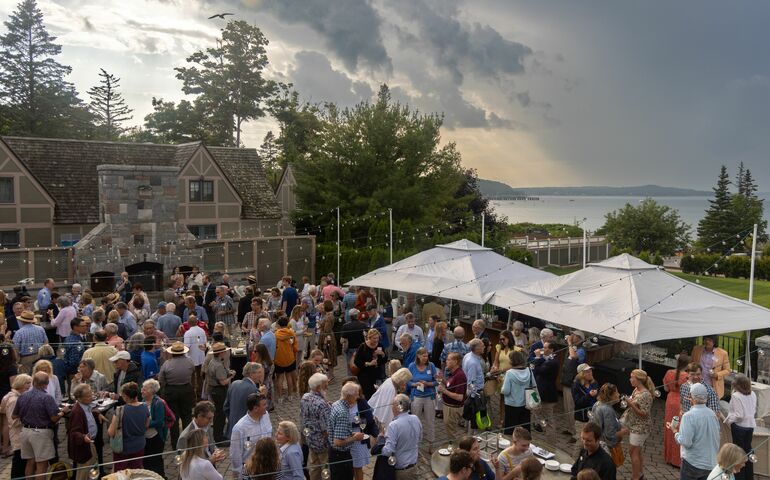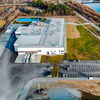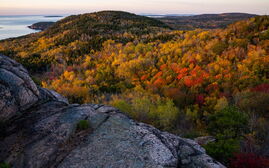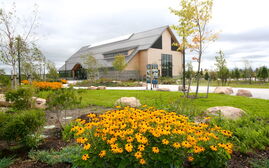
Processing Your Payment
Please do not leave this page until complete. This can take a few moments.
- News
-
Editions
View Digital Editions
Biweekly Issues
- December 15, 2025
- December 1, 2025
- Nov. 17, 2025
- November 03, 2025
- October 20, 2025
- October 6, 2025
- + More
Special Editions
- Lists
- Viewpoints
-
Our Events
Event Info
Award Honorees
- Calendar
- Biz Marketplace
Friends group supports Acadia with thousands of volunteer hours and key grants
 Courtesy / Sam Mallon, Friends of Acadia
Nearly 300 gathered at the Bar Harbor Club for Friends of Acadia’s annual meeting and reception.
Courtesy / Sam Mallon, Friends of Acadia
Nearly 300 gathered at the Bar Harbor Club for Friends of Acadia’s annual meeting and reception.
Climate-smart restorations, along with trail rehabilitation and maintenance, were all in a day’s work last year in Acadia National Park, thanks to the efforts of a local stewardship group called Friends of Acadia.
Highlights of the group’s 2022 impact report were presented to members at its annual meeting earlier this month.
With 4,607 members, the group put in 4,921 in volunteer hours in 2022 as part of its stewardship of the park.
Since 1986, the group has invested $35.7 million in grants to the park and surrounding communities.
With total net assets of $74.6 million, $6.5 million in revenue in 2022 included $3.1 million in unrestricted contributions, grants, and events plus $3.4 million in donor-restricted funds raised in prior years used for intended purposes.
Program expenses for 2022 totaled $3.7 million and operating expenses were $5.2 million.
New CEO
The year was marked by the arrival of a new president and CEO, Eric Stiles.
“Under Eric’s leadership, and with the guidance of former President David MacDonald, Friends of Acadia has focused increasingly on its partnership role with Acadia National Park aimed at addressing the workforce housing shortage on Mount Desert Island,” Jack Kelley, chair of the group’s board of directors, wrote in his introductory message to the group’s 2022 impact report.

Friends of Acadia works with Acadia National Park to identify places and projects where a mix of private philanthropy, volunteerism, leadership and partnerships most benefit the park’s critical needs.
Climate resilience
In July 2022, National Park Service Director Charles Sams spent a week at Acadia, including a stop at one of the park’s features, Great Meadow Wetland.
Sams highlighted $500,000 of federal funding that Acadia received to help improve the health and function of the wetland while improving its climate resiliency.
“This is a great example of climate resiliency and climate adaptation and bringing back ecosystem function into the wetlands,” said Sams who suggested that Acadia’s leadership would lay a foundation for the entire National Park System.
Funds will help improve water flow and quality, reduce flooding, expand wildlife passage, remove invasive plants, restore native plants for future climate conditions, and enhance recreational opportunities in the wetland. It builds on six years of work in the Great Meadow by the park, Friends of Acadia and Schoodic Institute.
Additional highlights for 2022 included Friends of Acadia’s support for the park’s invasive plant management team, which surveyed over 978 acres of the park for invasive plant species. The group helped maintain a long-term stream flow gauge at Otter Creek, an important reference for predicting stream flows throughout Acadia.
Youth corps
For five decades, Friends of Acadia has supported the Acadia Youth Conservation Corps, considered a key player in maintaining Acadia’s trails and carriage roads. When the program paused during the summer of 2020 and 2021, the group, with park staff, used the time to reimagine the program to give participants more diverse experiences with broader educational opportunities and exposure to other park programs.
In the summer of 2022, the program welcomed seven participants ranging in age from 15 to 18. The group worked all over the park and in multiple divisions — from replacing 250 feet of bogwalk on the Giant Slide Trail and collecting garbage from 100 yards of beachfront on Isle au Haut, to painting carriage road gates, clearing back drains and pulling invasive glossy buckthorn at Kebo Brook Trail and Great Meadow.
Educational programs
Friends support allowed 461 students and 69 teachers to participate in the Schoodic Education Adventure — a field-based outdoor education program at the Schoodic Education and Research Center.
The group organized exploration of the park for 96 family teams participating in a program called Acadia Quest; funded five outdoor classrooms for schools across Maine and New Hampshire; funded park experiences for four urban and diverse youth groups who went to Acadia from cities across the country; and supported six teacher fellows who went to Acadia to learn and share outdoor teaching techniques and lesson plans tied to national parks.
Transportation
The group helped return Island Explorer bus service to full operations in 2022, when it carried 414,808 passengers and reduced smog-causing pollutants by approximately 11.3 tons and greenhouse gases by an estimated 1,452 tons.
The group also enabled the Summit Stewards to contact 41,863 visitors to Acadia and engage 17,805 visitors with messages about how to minimize recreational impact by practicing Leave No Trace; research visitation patterns and length of stay at the Bass Harbor Head Light and conduct parking surveys and capacity studies at the Jordan Pond North parking lot; and purchase a wheelchair accessible carriage for use by Wildwood Stables to provide greater opportunities for visitors using wheelchairs to enjoy the carriage roads.
Friends of Acadia helped fund the research and writing for the nomination of Acadia’s hiking trail system for listing on the National Register of Historic Places. It’s the largest and the first trail system on the register that originated from paths traveled by mid-19th century American landscape artists who found inspiration on Mount Desert Island. The trails were listed in the register in the spring of 2022. The listing includes 109 historic, maintained trails covering 117 miles, and 18 memorial plaques or markers, 12 viewpoints, and unique engineering features. Some of those trails are outside the park boundary on Mount Desert Island, which is why the official listing is “The Mount Desert Island Hiking Trail System.”
Friends of Acadia is working with the National Park Service and other partners to provide affordable seasonal workforce housing by developing a seasonal workforce housing strategy with a goal to provide the 130 new beds needed for the park and partners.
Mainebiz web partners
Related Content

The Giving Guide
The Giving Guide helps nonprofits have the opportunity to showcase and differentiate their organizations so that businesses better understand how they can contribute to a nonprofit’s mission and work.
Learn More
Work for ME
Work for ME is a workforce development tool to help Maine’s employers target Maine’s emerging workforce. Work for ME highlights each industry, its impact on Maine’s economy, the jobs available to entry-level workers, the training and education needed to get a career started.
Learn More
Groundbreaking Maine
Whether you’re a developer, financer, architect, or industry enthusiast, Groundbreaking Maine is crafted to be your go-to source for valuable insights in Maine’s real estate and construction community.
Learn more-
The Giving Guide
The Giving Guide helps nonprofits have the opportunity to showcase and differentiate their organizations so that businesses better understand how they can contribute to a nonprofit’s mission and work.
-
Work for ME
Work for ME is a workforce development tool to help Maine’s employers target Maine’s emerging workforce. Work for ME highlights each industry, its impact on Maine’s economy, the jobs available to entry-level workers, the training and education needed to get a career started.
-
Groundbreaking Maine
Whether you’re a developer, financer, architect, or industry enthusiast, Groundbreaking Maine is crafted to be your go-to source for valuable insights in Maine’s real estate and construction community.
ABOUT
NEW ENGLAND BUSINESS MEDIA SITES
No articles left
Get access now
In order to use this feature, we need some information from you. You can also login or register for a free account.
By clicking submit you are agreeing to our cookie usage and Privacy Policy
Already have an account? Login
Already have an account? Login
Want to create an account? Register
Get access now
In order to use this feature, we need some information from you. You can also login or register for a free account.
By clicking submit you are agreeing to our cookie usage and Privacy Policy
Already have an account? Login
Already have an account? Login
Want to create an account? Register











0 Comments